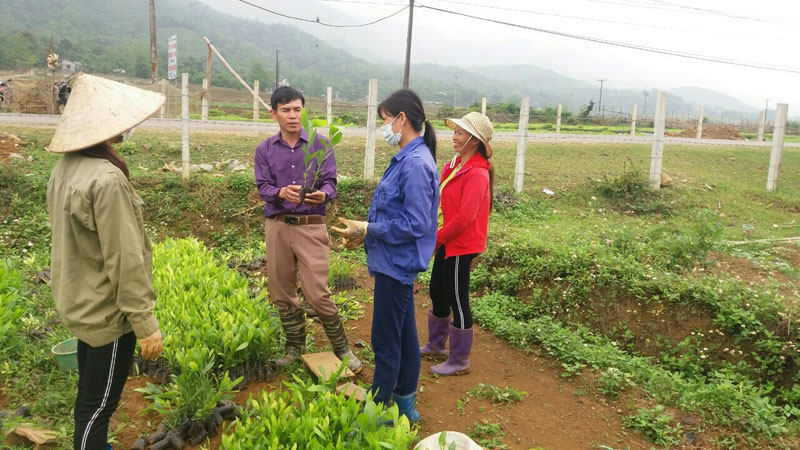
(HBO) – In recent years, the local people in Kim Boi district have concentrated on economic developments towards forest production. Forest economic development brings realistic benefits for economy-society, protects watershed forests, protects environment, increases forest cover and creates jobs, ensures stable income and contributes to hunger eradication and poverty reduction for the local people.
The nursery of Mr. Quach Van Canh’s family at
Ma hamlet, Cuoi Ha commune, providing the acacia seedlings has become a
familiar address for many farmers inside and outside the commune.

Mr. Quach Van Canh at Ma hamlet, Cuoi Ha
commune (Kim Boi district) tested the quality of acacia seedlings before
exporting.
Before implementing the nursery model, Mr.
Canh’s family mainly cultivated rice and corns but their productivity and
economic efficiency were very low. It was realized that the movements of
planting forest in the commune as well as in the district have developed
strongly while the supply of seedlings was weak, and the farmers had to
purchase seeds from other places for double price but the survival rate of
trees was low. In 2013, he borrowed 20 million VND from the District Bank for
Social Policies in order to invest in acacia nursery with the area of over 1000
m2. In the first year, Mr. Canh planted one kilo of Acacia
auriculiformis and Acacia mangium. Because of the proper application of
techniques and being hard working to monitor each tree, he got incredible
earnings from over 300 thousand seedlings which have been sold out with the
average price of 400 VND per tree. Excepting for all expenditures, the net
profit was about 35 million VND. Perceiving the high economic efficiency from
the acacia nursery, up to the present, his family has expanded the area by 2000
m2 as well as increased nearly 1 million trees per years. Apart from
all expenditures, his family earns approximately 100 million VND annually.
Because of the nursery, Mr. Canh’s family has currently had a stable life and his
children have sufficient conditions to study. Not only pioneering in economic
development and enriching legitimately, but Mr. Canh also created regular jobs
for five workers in the hamlet with the average income of three million VND per
person per month.
Since the beginning of this year, under the direction of the Department of Agriculture and Environment, the Sub-Department of Agricultural, Forestry, and Fishery Product Quality Management has strengthened the integration of the professional activities to promote and guide the organizations and individuals in the production and trading of agricultural, forestry, and fishery products to comply with the legal regulations regarding the use of chemicals, pesticides and veterinary medicines in crop cultivation, livestock farming and aquaculture. They also provide guidance to processing and manufacturing establishments on keeping the records to trace the product origins and using food additives from the approved list according to the regulations.
Hoa Binh province saw a significant rise in state budget revenue in the first two months of 2025, heard a meeting chaired by Vice Chairman of the provincial People’s Committee Quach Tat Liem.
Ha Thi Ha Chi, a 26-year-old graduate in law, has taken an unconventional path by returning to her hometown in Mai Chau district to establish the Tong Dau Cooperative, creating stable jobs for local women and bringing Thai ethnic brocade weaving to the global market.
As the Lunar New Year 2025 approached, pork prices surged, creating a profitable season for farmers in Tan Vinh commune, Luong Son district. Taking advantage of the rising demand, Can Minh Son, a farmer from Coi hamlet, sold over 30 pigs at 69,000 VND/kg, each weighing more than 100 kg. After deducting expenses, his family earned a profit of over 50 million VND.
alternate member of the Central Party Committee, Secretary of the Hoa Binh provincial Party Committee Nguyen Phi Long on March 5 had a working session with Yan Jiehe, Founder and Chairman of the China Pacific Construction Group, one of China's largest private corporations in the field of transport infrastructure. Deputy Secretary of the provincial Party Committee, Chairman of the provincial People's Committee Bui Duc Hinh and leaders of provincial departments and sectors also attended the working session.
The electronic printed circuit board (PCB) manufacturing and processing plant of Japan’s Meiko Group, located at Da River Left Bank Industrial Park in Hoa Binh city with a total investment of over 200 million USD, is expected to create thousands of jobs and make a significant contribution to the local budget.



